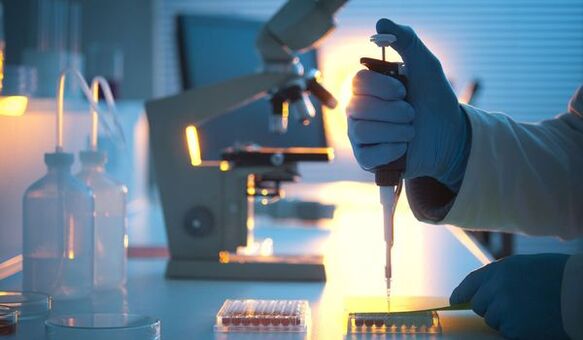Worm infection - infection of the human body with parasitic worms - worms (helminths). Symptoms of helminthic invasion are determined by the mode of infection, the number of parasites obtained, their degree of adaptability in the human body, and other characteristics.
The first signs of the disease in adults can appear 2-3 days after infection and a year and a half later, but the incubation period is usually 2-3 weeks.
Helminths do not tend to multiply in the human body (except for dumplings and some other worms)
Methods of infection:
- contact the household;
- nutritious;
- transferable;
- percutaneously.
The source of infection is a patient or carrier.
Classification of helminth samples
More than two hundred species of helminths have been parasitized in adults, which, according to their structural characteristics, belong mainly to two types of worms:
- Roundworms are nematodes that cause diseases such as ascariasis, enterobiasis, trichuriasis, trichinosis, dracunculiasis, filariasis, toxocariasis.
- Flatworms can be divided into:
- a class of tapeworms that causes teniarin, teniasis, cysticercosis, diphyllobothriasis, hymenolepiasis, echinococcosis;
- a class of metastases that cause schistosomiasis, opisthorchiasis, clonorchiasis, fascioliasis, dicrocelliasis.
Depending on the characteristics of the life cycle and transmission factors, three main types of intestinal worms are distinguished: geohelm samples, biohelm samples, contact helminths.
The effect of parasites on the human body
The vast majority of worms live in the intestines of adults, however, certain types of larval parasitic worms reach the tissues of other organs (liver, brain, heart, lungs, eyes, etc. ). During the vital activity of helminths, toxic substances are formed that penetrate the bloodstream and reach various organs. In addition, helminths in the human gut absorb vital substances (amino acids, fatty acids, glucose, enzymes, and others), leading to breakdowns in the body’s physiological systems.
Helminthic invasion during pregnancy is doubly dangerous: the detrimental effect is not only on the condition of the mother but also on the maturation of the embryo.
Worm infection can make pregnancy more difficult. Infection in a woman's body reduces the absorption of nutrients, which is highly undesirable during pregnancy.

In addition, helminths can cause severe toxicosis during pregnancy. Pinworms can penetrate a woman's genitals. This leads to severe itching and consequent permanent discomfort and sleep disturbances.
There are helminths that can damage the intestinal wall. As a result, small but long-term blood loss is possible. It is fraught with the development of iron deficiency anemia in pregnant women.
Helmamples are able to cross the placental barrier and parasitize the fetal trunk and body. In addition, they can enter the brain and lead to an increase in the size of the head, making it harder for the birth to take place.
Their presence in the lungs is also dangerous - after which the child develops chronic inflammation.
Clinic
A distinction must be made between the acute stage of helminthic invasion, which is characterized by a more pronounced clinic, and the chronic stage, which can last for several years and manifest as disappearing symptoms.
The most common symptoms of helminthic invasion are:
- Appearance of gastrointestinal disorders, namely:
- constipation (blockage of the lumen of the gut due to blockage of the bile ducts with worms);
- loose stools (due to the effects of substances produced by helminths);
- excessive gas formation (due to indigestion).
- Joint and muscle pain - occurs when parasites enter the synovial fluid and muscles.
- Skin symptoms (rash, eczema, itching, acne) caused by toxic substances produced by helminths.
- Nervous system disorders, expressed as:
- anxiety;
- irritability;
- longing;
- sleep disturbance, etc.
- Weight loss associated with metabolic disorders.
- Symptoms of catarrhal airways (runny nose, cough) resulting from penetration of helminths.
Indirect signs of helminthic invasion:
- enlarged lymph nodes;
- increased body temperature;
- fatigue, asthenia;
- nausea (may be during pregnancy as a manifestation of toxicosis);
- headache;
- anemia (due to blood loss);
- itching in the perineum.
Diagnostics
Stool analysis or scraping of folds around the anus is usually performed in adults to detect intestinal worm invasion. Worm eggs are examined microscopically and their appearance is determined.
However, this analysis does not always help to identify helminth samples. The most specific mode of helminthic invasion is a blood test for the presence of antibodies to various types of worms. In a general blood test, when the body is infected with helminths, an increase in the content of eosinophils and leukocytes is observed.

Fecal analysis may not be sufficient to identify worms during pregnancy. Ultrasound, blood tests and amniotic fluid analysis should be performed for a more reliable diagnosis.
Therapy
If signs of helminthic invasion are detected and the diagnosis is confirmed by blood and stool tests, treatment should be based on the type of parasite. To do this, your doctor will prescribe special anthelmintic medications. More often, these drugs do not enter the bloodstream and work only in the intestines. For this reason, the potential for toxic effects on the body is minimal.
In some situations, a single use of the drug is sufficient to get rid of the worms, in other cases a longer treatment is required, which will be set up by a specialist according to an individual regimen.
This is a prerequisite for the disease not to become chronic. The main task of re-treatment is to destroy parasites that have entered the human body in the form of eggs and have not yet completed their developmental life cycle. After a while, they become adults and are killed by drugs.
Generally, the whole family should be treated with blood and stool tests to achieve good results.
Pathogenetic therapy includes anti-allergic drugs, drugs aimed at normalizing the intestinal flora.
However, they also treat concomitant illnesses, which often develop as complications of helminthiasis (anemia, hypovitaminosis, malnutrition).
In addition to the anthelmintic effect of the drug during pregnancy, the possible effect on the fetus is also considered.
Generally, during the first trimester of pregnancy, when the deposition of the main organs and systems of the embryo is in the developmental stage, it is better to avoid such treatment. During this period, any medication can do much more harm to the fetus than the likely risk of contact with the worms.

At this stage, you can try to get rid of the parasites using non-medicinal means.
There are a number of prescriptions that can supplement basic treatment and sometimes completely replace drug therapy. The best-selling tools in helminths are:
- pumpkin seeds;
- onion;
- garlic;
- pomegranate juice;
- infusions of tansy and wormwood.
In the second and third trimesters, the likelihood that the drugs will have a negative effect on the fetus and its carrier decreases.
After completion of therapy, the worms should be re-analyzed - scraped. This is done to make sure that the prescribed treatment is correct and that all worms are killed.
It should be recalled that therapy should be performed under the supervision of a specialist. Repeat analysis should be performed no earlier than 2 weeks after the end of treatment. The process of therapy can be considered complete with 3 negative tests at 2-week intervals.
Prevention
Measures to prevent helminthiasis:
- adherence to personal hygiene rules (washing hands before eating, personal use
- personal care products, personal underwear and bed linen);
- mandatory washing of vegetables, fruits, greens with water before eating;
- complete heat treatment of meat and fish;
- control of blood-sucking insects;
- regular wet cleaning indoors;
- full board care;
- regular change of underwear and linen, with compulsory ironing;
- exclusion of swimming in water bodies with a high probability of infection of helminth samples.
Helm specimens should be examined when planning pregnancy. If present, a treatment should be given before pregnancy to avoid harm to the baby's body.
Timely and complete treatment of the acute form of helminthiasis to prevent the chronic course of the disease.






































